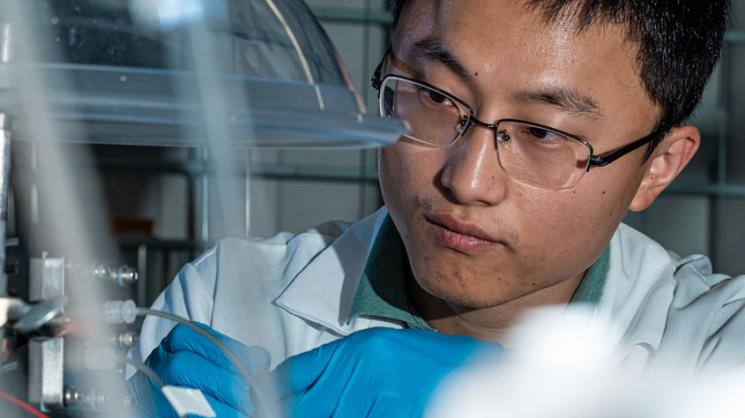Haotian Wang, assistant professor and William Marsh Rice Trustee Chair of Chemical and Biomolecular Engineering, has received a three-year, $240,000 research grant from the Houston-based Robert A. Welch Foundation to study ways to covert waste carbon dioxide (CO2) into useful products using nanotechnology.
Wang’s project is titled “Isolated Transition Metal Single Atomic Sites for Selective CO2 Reduction.”
“We seek to convert waste CO2 back into valuable fuels or chemicals, with the input of renewable energy, and in that way revolutionize the way we produce chemical feedstocks while helping to mitigate climate change in the future,” Wang said.
At present, the CO2 reduction reaction has limited results. Highly selective and active
electrocatalysts have yet to be designed. A deeper understanding of the reaction mechanisms, Wang said, must be understood before practical applications can be developed.
“We propose to shrink nanosized metal catalysts further down to ‘single-atom catalysts,’ where metal atoms are isolated in well-defined carbon supports, with optimized interactions with CO2 reduction intermediates, in both catalyst development and basic understanding,” Wang said. A more thorough understanding of the proper electronic structure would lead to a better design of CO2 reduction reaction catalyst.
Markets exist for recovered CO2, as in the beverage industry and in enhanced oil/gas recovery. Wang and his lab partners have already built a catalytic reactor that uses carbon dioxide as its feedstock and produces highly purified and high concentrations of formic acid.
“Carbon dioxide reduction is important for its effect on global warming as well as for green chemical synthesis,” Wang said. “If the electricity comes from renewable sources like the sun or wind, we can possibly create a loop that turns carbon dioxide into something important without emitting more of it.”
Wang earned in Ph.D. in applied physics from Stanford University in 2016 and joined the Rice faculty in 2019, after working as a fellow of the Rowland Institute at Harvard University. His research focuses on renewable energy technologies, including novel electrocatalysts for energy storage, sustainable chemical synthesis and water treatment.

